We may not have the course you’re looking for. If you enquire or give us a call on 01344203999 and speak to our training experts, we may still be able to help with your training requirements.
Training Outcomes Within Your Budget!
We ensure quality, budget-alignment, and timely delivery by our expert instructors.
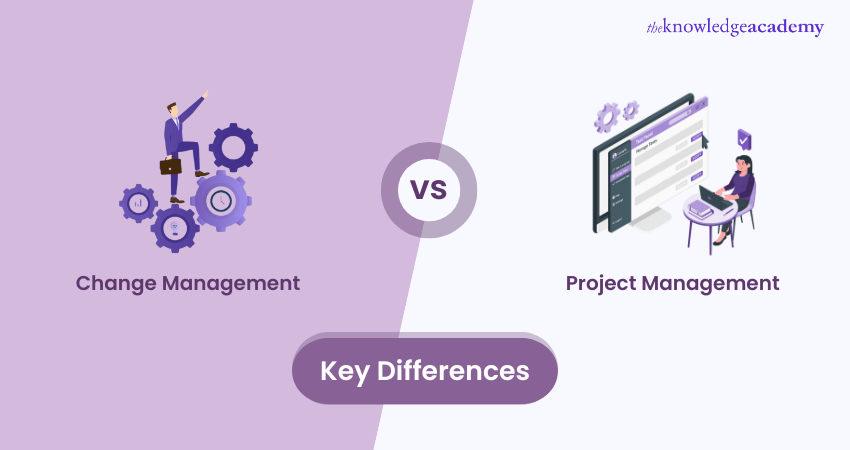
Change is a constant in today's fast-paced business environment. Organisations must adapt to market shifts, technological advancements, and evolving customer expectations to stay competitive. To effectively navigate change, two critical disciplines come into play - Change Management and Project Management. The Change Management vs. Project Management debate has been prevalent for a while as both represent distinct approaches with different goals and methodologies
In Project Management, risks are assessed in relation to the project's objectives, and mitigation strategies are developed to minimise their impact. With the help of Change Management strategies in organisations has significantly improved their functioning and response to change. According to Gartner, the use of a Change Management strategy increases the chance of change success by 22% in organisations.
Learn about the relationship between Change Management and Project Management and explore their differences and similarities in this blog.
Table of Contents
1) What is Change Management?
2) Benefits of Change Management
3) What is Project Management?
4) Benefits of Project Management
5) Change Management vs. Project Management: Differences
6) Change Management and Project Management: Similarities
7) Conclusion
What is Change Management?
Change Management is a structured approach aimed at helping individuals, teams, and organisations transition from their current state to a desired future state, often guided by various change management models. It recognises that change is about implementing new processes or technologies and addressing the human aspects of change, such as emotions, attitudes, and behaviours.
The Importance of Change Management is high, as it offers several benefits that contribute to successful organisational transformations. Here are five key benefits of using Change Management:
a) Minimises resistance: Change Management strategies help identify potential sources of resistance, allowing organisations to engage and communicate with stakeholders proactively.
b) Enhances employee engagement: It increases employee engagement and satisfaction by involving employees in the change process and encouraging their input.
c) Facilitates effective communication: Effective communication is a cornerstone of successful Change Management. Organisations can ensure that stakeholders receive timely and accurate information about the change by implementing structured communication plans.
d) Mitigates risks: It helps organisations identify and manage potential risks associated with change initiatives. Through thorough assessments, organisations can anticipate and address challenges during the change process.
e) Ensures long-term sustainability: It focuses on building a foundation for long-term sustainability by reinforcing the desired changes, encouraging continuous improvement, and fostering a change-ready culture.
Benefits of Change Management
A clear Change Management process can make it easier for managers, employees, and important people involved to handle big changes in a company. Organisations hire Change Managers to support these changes. They clarify new ways of doing things to employees and address their concerns. The main advantages of using Change Management involve:
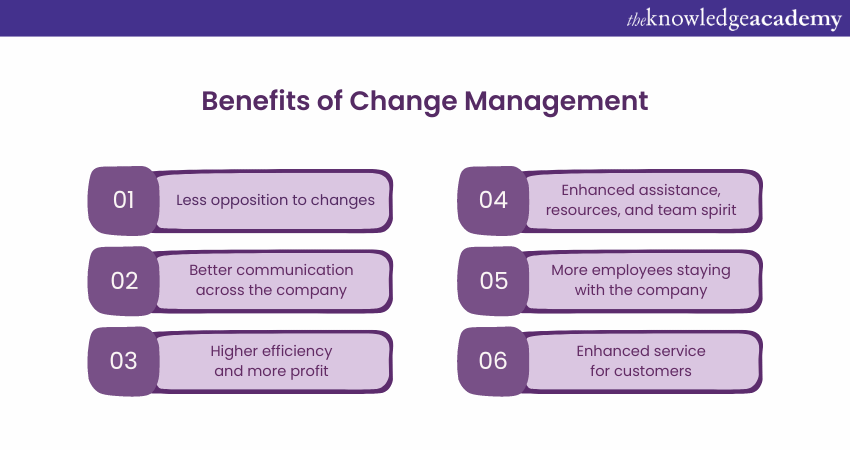
a) Less opposition to changes: People are less likely to push back against new ideas or ways of doing things.
b) Better communication across the company: Communication across the company is made better through Change Management.
c) Higher efficiency and more profit: It can make the work output and financial gains go up.
d) Enhanced assistance, resources, and team spirit: Better assistance and utilisation of resources are improved which directly impacts the team spirit.
e) More employees staying with the company: Making favourable conditions and healthy work atmosphere keeps employees loyal.
f) Enhanced service for customers: The quality of service provided to customers is improved by implementing changes strategically.
Get ready for your interview with our top Change Management Interview Questions.
What is Project Management?
Project Management focuses on the planning, execution, and control of specific endeavours with the aim of achieving defined objectives within a set timeframe and budget. It provides a structured framework for managing projects, ensuring they are delivered efficiently and effectively, and meeting predetermined quality standards.
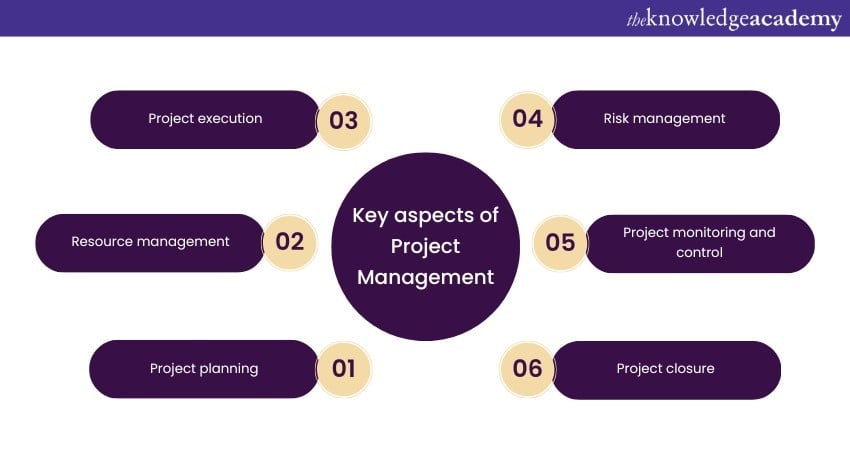
Project Management involves a systematic approach to managing these projects, utilising various tools, techniques, and methodologies to ensure their successful completion. Key aspects of Project Management include:
a) Project planning: Project planning is a critical phase where the scope, objectives, deliverables, and constraints are defined. It involves breaking down the project into manageable tasks, identifying dependencies, and estimating the resources, time, and budget.
b) Resource management: Resource management is essential for project success. Project Managers identify and allocate the necessary resources, including personnel, equipment, materials, and budget, to ensure the project can be executed as planned.
c) Project execution: Project execution involves carrying out the project activities according to the project plan. Project Managers coordinate the efforts of team members, monitor progress, and manage risks and issues that may arise during the project lifecycle.
Discover the Impact of Change Management Salaries on Career Growth and Organizational Success!
d) Risk Management: Project Management involves identifying, assessing, and managing risks that could impact project success. Project Managers analyse potential risks, develop risk mitigation strategies, and establish contingency plans to address unforeseen events.
e) Project monitoring and control: Project Managers regularly track project progress, compare it against the project plan, and make the needful adjustments to keep the project on track. They use Key Performance Indicators (KPIs) and Project Management tools to measure project performance.
f) Project closure: At the end of a project, project closure activities like project reviews, documenting lessons learned, celebrating achievements, and transitioning project deliverables to the appropriate stakeholders are conducted.
Do you want to learn Change Management Strategies to engage stakeholders effectively? Register now for our Managing Organisational Change Effectively Course!
Benefits of Project Management
Businesses employ Project Managers to assist in monitoring progress and improving the results of each project. They make sure that every team member knows their duties. They also give them deadlines to finish the project. In this process they help organisations achieve success and business goals. Discussed below are some of the advantages of Project Management that businesses can leverage:
a) Greater concentration and efficiency: Teams can concentrate more and work more efficiently.
b) Enhanced quality and customer benefit: The quality of work improves, leading to greater value for customers.
c) Lowered hazards and reduced costs: Risks are minimised, and costs are cut.
d) Enhanced cooperation and teamwork: Working together as a team becomes more effective.
e) Improved structure and resource distribution: Resources are managed better, leading to better organisation.
Dive into the detailed Case Study on Change Management.
Difference between Change Management and Project Management
Change Management and Project Management are distinct disciplines that serve different purposes and focus on different aspects of organisational initiatives. Principles of change management will help professionals in clearly grouping out objectives of different processes. Here are some key differences between both:
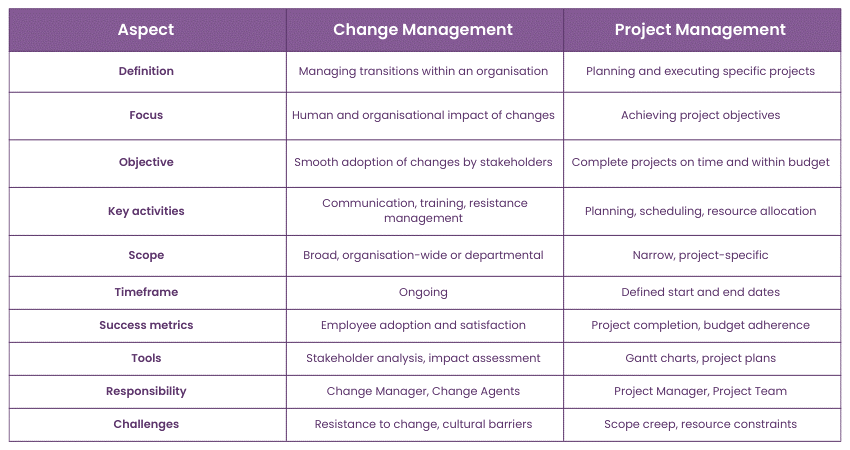
Acquire the skills to drive successful change initiatives in organisations – join our Change Management Foundation & Practitioner Training today!
Change Management and Project Management: Similarities
While Change Management and Project Management are distinct disciplines with different focuses, approaches, and objectives, they also share similarities. These similarities arise from the fact that both disciplines are concerned with driving successful organisational initiatives. Here are a few areas where both intersect:
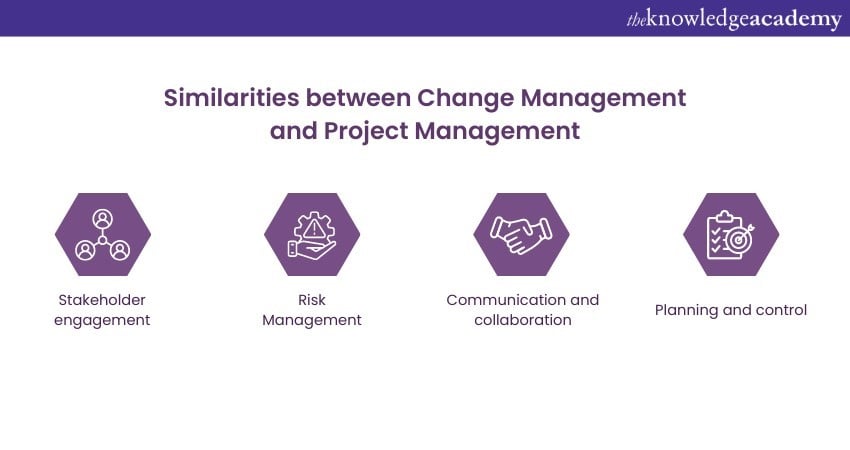
Stakeholder engagement
Engaging stakeholders is crucial in both Change Management and Project Management. For the latter, stakeholders may include project sponsors, team members, customers, and end-users. Similarly, Change Management involves identifying and involving key stakeholders impacted by the change. Engaging stakeholders through effective communication, collaboration, and involvement is essential for successful outcomes in both disciplines.
Risk Management
In Project Management, risks are assessed in relation to the project's objectives, and mitigation strategies are developed to minimise their impact. Change Management also addresses risks associated with change, such as resistance, lack of readiness, and potential disruptions. Identifying and managing risks proactively in both disciplines contribute to successful and sustainable initiatives.
Communication and collaboration
Both disciplines require clear and consistent communication to convey objectives, progress, and changes to stakeholders. Collaboration among team members, stakeholders, and project/change managers is essential to achieve alignment, address concerns, and foster a shared understanding of the initiatives.
Planning and control
Project Management involves creating project plans, defining tasks, allocating resources, and establishing milestones. Change Management also requires planning to address the human aspects of change, develop communication strategies, and identify training needs within the change management plan. Additionally, both disciplines require monitoring and controlling activities to ensure progress, make adjustments, and address issues or deviations from the planned course.
Discover the Best Change Management Books! Read our top picks and transform your organization today!
Conclusion
Determining the winner of the Change Management vs. Project Management debate is difficult as both are complementary disciplines that address different aspects of organisational transformation. We hope this blog has improved your understanding about the differences and similarities between Change Management and Project Management.
Get started on your Change Management journey by signing up for our Change Management Foundation Course now!
Frequently Asked Questions

Management involves overseeing and guiding the operations and strategy of an organisation, whereas Project Management is the application of knowledge, skills, tools, and techniques to project activities to meet specific project requirements.

A Project Management Office (PMO) can play a crucial role in Change Management by providing structured methods and processes for managing change within projects and across the organisation. It also ensures that the changes are implemented smoothly and effectively, aligning project outcomes with business goals and minimising disruption to operations.

The Knowledge Academy takes global learning to new heights, offering over 30,000 online courses across 490+ locations in 220 countries. This expansive reach ensures accessibility and convenience for learners worldwide.
Alongside our diverse Online Course Catalogue, encompassing 17 major categories, we go the extra mile by providing a plethora of free educational Online Resources like News updates, Blogs, videos, webinars, and interview questions. Tailoring learning experiences further, professionals can maximise value with customisable Course Bundles of TKA.

The Knowledge Academy’s Knowledge Pass, a prepaid voucher, adds another layer of flexibility, allowing course bookings over a 12-month period. Join us on a journey where education knows no bounds.

The Knowledge Academy offers various PRINCE2 courses, including PRINCE2 Foundation, Practitioner, and Agile. These courses cater to different skill levels, providing comprehensive insights into Project Management methodologies.
Our Project Management blogs covers a range of topics related to PRINCE2, offering valuable resources, best practices, and industry insights. Whether you are a beginner or looking to advance your Project Management skills, The Knowledge Academy's diverse courses and informative blogs have you covered.
Upcoming Project Management Resources Batches & Dates
Date
 Change Management Foundation & Practitioner
Change Management Foundation & Practitioner
Mon 13th Jan 2025
Mon 20th Jan 2025
Mon 27th Jan 2025
Mon 3rd Feb 2025
Mon 10th Feb 2025
Mon 17th Feb 2025
Mon 24th Feb 2025
Mon 3rd Mar 2025
Mon 10th Mar 2025
Mon 17th Mar 2025
Mon 24th Mar 2025
Mon 31st Mar 2025
Mon 7th Apr 2025
Mon 28th Apr 2025
Mon 12th May 2025
Mon 19th May 2025
Mon 9th Jun 2025
Mon 23rd Jun 2025
Mon 7th Jul 2025
Mon 21st Jul 2025
Mon 4th Aug 2025
Mon 18th Aug 2025
Mon 1st Sep 2025
Mon 15th Sep 2025
Mon 29th Sep 2025
Mon 13th Oct 2025
Mon 20th Oct 2025
Mon 27th Oct 2025
Mon 3rd Nov 2025
Mon 10th Nov 2025
Mon 17th Nov 2025
Mon 24th Nov 2025
Mon 1st Dec 2025
Mon 8th Dec 2025
Mon 15th Dec 2025







 Top Rated Course
Top Rated Course



 If you wish to make any changes to your course, please
If you wish to make any changes to your course, please


